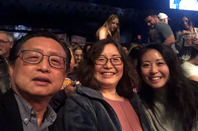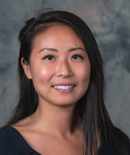Interview with Michelle Chong, MD
A Conversation with Michelle Chong, Assistant Clinical Professor
You've been with DHM as one our amazing hospitalist the past year. Share something about yourself.
I’m a first generation Korean American, the younger daughter of an engineer and a pharmacist. I grew up in a suburb outside LA in the San Gabriel Valley, which I used to think was what people meant by “The Valley,” until I first moved away for medical school and realized they meant San Fernando Valley. I moved back for residency at UCLA and now moved to the Bay to join my partner up here. I love food, animals, traveling, and medicine. Excited to be a part of this division!


What is your guilty pleasure?
I like to watch reality TV shows in my free time. I still enjoy The Bachelor franchise and have also recently gotten very into Survivor. I try to justify it to myself by saying it’s interesting to see the way different personalities interact with each other, but mostly it’s a nice way to unwind and relax the brain when work is stressful.
What is the most heartwarming thing you’ve ever seen as a hospitalist?
One of the most heartwarming but also heartbreaking things I’ve seen was while rotating in the MICU as a resident. We had a patient who was critically ill, but still alert and able to communicate. Her long-term partner of more than 30 years stayed by her side the entire time she was there. One night when I was on call, one of the nurses working was an ordained minister and married them overnight. The whole ICU then got together and got her a wedding veil, cards, and decorated her room for the event. She passed away shortly after, but it was so touching to see everyone work on making those last moments special for her and her partner.
What book or movie had a big influence on you? What books would you recommend to read?
I’ve read a lot of good books recently thanks to my book clubs. One of my favorite recent reads was Anxious People by Fredrick Backman. It was funny and lighthearted, yet addressed challenging subjects of depression, suicide, and the struggles of parenthood in such a touching way. I would also recommend Homegoing by Yaa Gyasi for a unique telling of the tragic consequences of slavers’ actions in what is now Ghana. It’s very thought provoking and written in a very compelling, page-turning way.
What is a skill you learned when you were young that you still use today?
When I was young, I was a voracious reader. Up until around fourth grade, I was that bookworm reading during recess. I read classic literature starting from elementary school and could read really quickly. A couple of my teachers had reward systems for reading books and answering quizzes on them, like In-N-Out gift certificates or lunchtime outings, and I broke records for those points. I still love reading fiction for fun and non-fiction to learn. It’s also very helpful in medicine as we need to do a lot of reading, from notes in the EMR to staying up to date on literature.
If you had unlimited resources, how would you live your life and what would you do?
I would travel more, learn more about the world, and see how to best use my resources to try to make it better.
Since you would love to travel more, what country or place would you visit over and over again?
When it comes to travel, I usually want to visit new places before returning to an old one. But I love the idea of finding somewhere that is so special I’d want to visit over and over. For now, I would have to say my home of Los Angeles. There’s no place like home! Also, it’s warm, sunny, and has such good food.
What do you believe in despite having no proof of it?
I am weirdly superstitious when it comes to work. If my day is going smoothly, and somebody mentions that or asks me about it, I’m convinced it will become very busy or something bad will happen to my patients. I also won’t wear black socks to work because I’m afraid it would bring “black cloud” energy.
- by Lena Loo
View Michelle's professional bio | Go back to interviews
